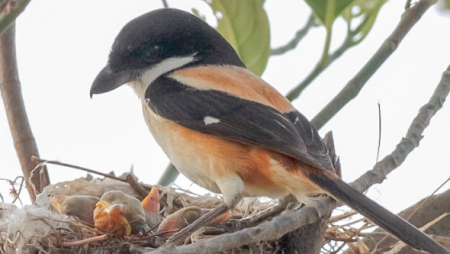Plastic in the nest: A risky adaptation?
Undoubtedly, wildlife occupies a vital niche within our ecosystem. Regrettably, the rampant spread of plastic pollution has inflicted severe tolls on various species worldwide. Penetrating their food chains, plastics have inflicted grave damage to animals' digestive systems, leading to fatal blockages

The emergence of plastic materials following the Bronze and Iron Ages marked a significant epoch in modern civilization. Initially lauded for its durability, resistance to chemicals, and waterproof properties, plastic swiftly found its way into diverse industries, spanning from food packaging to cutting-edge space technology.
However, as its prevalence increased, so did its unintended repercussions on the environment. Despite its cost-effectiveness, the indiscriminate disposal of plastic products, without regard for their ecological impact, has given rise to an urgent ecological challenge.

Undoubtedly, wildlife occupies a vital niche within our ecosystem. Regrettably, the rampant spread of plastic pollution has inflicted severe tolls on various species worldwide. Penetrating their food chains, plastics have inflicted grave damage to animals' digestive systems, leading to fatal blockages.
Additionally, plastic exposure makes wildlife more susceptible to diseases. Heart-wrenching instances of creatures ensnared in discarded plastic objects serve as stark reminders of their grim predicament.

In the face of these adversities, certain species of birds and mammals have displayed remarkable resilience. For instance, the long-tailed Shrike (Lanius Schach) and others have ingeniously incorporated plastic materials into their nests, reinforcing them against harsh elements and potential predators.
This resourcefulness stems from a blend of instincts, past experiences, and adaptability. Starlings, Mynas, and Parakeets have likewise showcased this behaviour, outcompeting their counterparts and enhancing the survival prospects of their offspring.

While these adaptive behaviours stand as a testament to nature's ability to withstand challenges, they also come with far-reaching consequences. The transition from traditional nest materials to plastic disrupts critical activities, such as seed dispersal by birds.
Unlike biodegradable materials, plastics persist in the environment, exerting negative effects on soil conditions and hindering tree growth. The plastic preference exhibited by species like Starlings, Shrikes, Mynas, and Crows leads to an ecological imbalance, resulting in a decline in prey populations and upsetting the intricate web of life
Addressing this crisis necessitates a multi-pronged approach. While past efforts have largely concentrated on cleanup initiatives, the true focus should shift toward effective waste management. Essential measures include employing covered trash bins to prevent wildlife scavenging and waste dispersal.

The collective responsibility of responsibly disposing of non-recyclable waste has the potential to drive positive change. Raising awareness alongside educational institutions instilling waste management values, holds promise for reshaping attitudes.
Engaging individuals of all ages, particularly through interactive programs and festivals, can amplify the movement against plastic pollution.

Unchecked urbanisation and inadequate waste management practices are dismantling ecosystems, while plastic exposure accelerates the march toward an ominous future. The prevalence of plastic-made nests, now a common sight in urban areas, foreshadows the perils that could befall nature's pristine habitats.

If this infiltration of plastic extends into grasslands and jungles, the delicate equilibrium of entire ecosystems hangs in the balance. To avert this potential catastrophe, a harmonious coexistence of innovation and environmental stewardship becomes imperative, sparing countless lives from an impending, darker fate.




 Keep updated, follow The Business Standard's Google news channel
Keep updated, follow The Business Standard's Google news channel
















